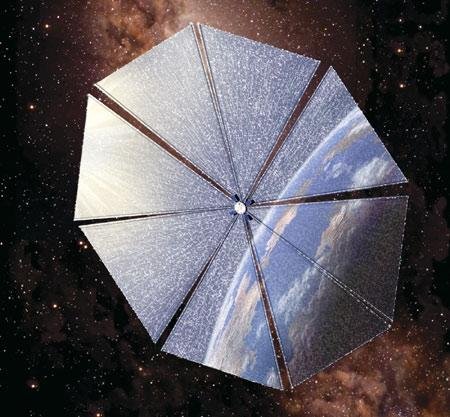How much do shadows weigh?
No, shadows themselves have no weight. They cannot be placed on a weighing scale and measured,but they certainly have an effect on an objects weight when they fall.
Photons hit an object's surface similar to a ball hitting on a wall, except this ball is very, very small.
As a result of this, particles hitting the objects surface exerts some force resulting in a very small increase in weight. However, when considering larger surface areas into consideration, these small change in masses add up to large values and things start getting interesting.

Source
Sunlight, being the most widely available source of light exerts a pressure of approximate 10^(-9) lbs/ inch square. When considering larger surface areas such as countries and continents extending over millions of square miles , the total force exerted by sunlight adds up to large values. For e.g. North America weighs around 38 million pounds more solely due to the sun's radiation pressure.

Solar sails utilise the radiation pressure from sunlight to move around in space (Source)
Solar sails, similar to ship's sail, is propelled by photons hitting it surface causing it move around in space. Radiation pressure is extremely pronounced after leaving the earth's atmosphere. For example, had its effects been ignored during the Mars landing in Viking's program, it would be missing the planet's orbit by around 15000 kms!!
To conclude, shadows might not weigh themselves, but they certainly reduce an object's weight.
Well then when the eclipse happens, although a small area, the earth should weigh less and have less gravity. Then perhaps shadows have a weight.....just a negative weight.
@nedspeaks Shadows don't have weight. Light does, shadow is simply the absence of light, hence it implies the absence of light's weight. You can think of it this way. Objects when perfectly dark have a certain weight.Light falling on them increases this value. When we weigh ourselves on a scale, ideally this should give different results in different lighting. But this value is extremely small and so it barely makes a difference. :-)
Being a physics major from Cambridge, UK, I did understand it the first time around. I was trying to make point that if you could measure the radiation weight the the effect of it on the object it falls on, then a time a shadow is cast it will make a difference in the weight. I know that it smaller than small but the philosophical point was that because a shadow cannot be cast with blocking photons and radiation, it must indirectly effect weight
@nedspeaks Totally overlooked the "negative" part. That's a nice way of interpreting it. Shadows are really strange that way. It's merely an absence of something, yet it acts as something concrete, affecting so many variables. Another important property of shadow, is that it is able to travel faster than light(not in the real sense, of course, just an interesting interpretation). I'll probably write about this in my next article.
P.S. My re-iteration wasn't meant as an insult to your knowledge as a Cambridge alumnus. If it did, I sincerely apologize.